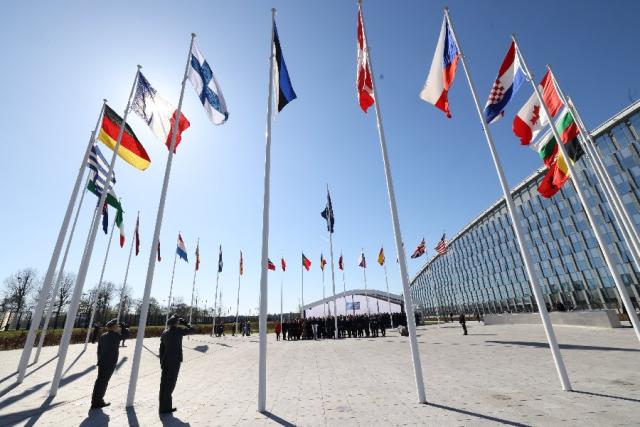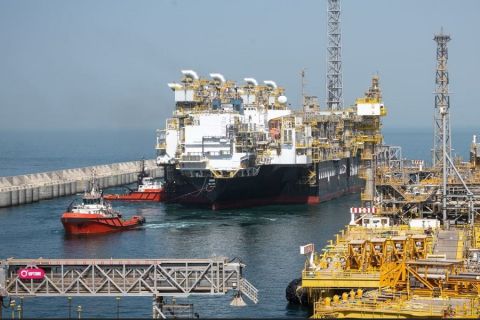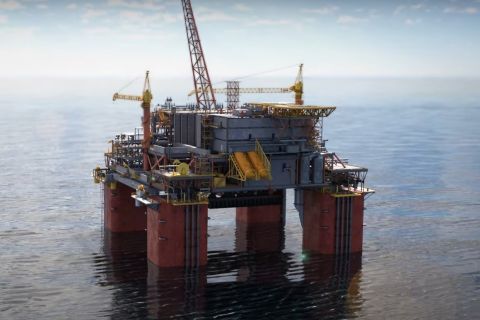
Flags in front of NATO’s headquarters. (Source: Office of the UK Prime Minister)
The Russia-Ukraine war is a “watershed” event, and the aftershocks will continue to shape the energy sector — and energy security — going forward, Eurasia Group’s Raad Alkadiri said during Reed Smith’s private Energy and Commodities Conference.
“It's not just oil and gas, but the energy sector sort of globally will be important in determining investment signals. It will be important in determining capital flows, but also it will be very important in determining the shape of energy flows as well,” Alkadiri said April 20 during a keynote address in downtown Houston.
“What the war in Ukraine has done is brought energy security and made it the top priority in terms of concerns about energy moving forward,” said Alkadiri, Eurasia’s managing director for energy, climate and resources. “And, that has had a number of structural implications in terms of the sector.”
Alkadiri sees key issues caused by the war affecting energy, including:
Politics, rather than markets, serving as the determining force for energy flows to a larger extent than before;
Greater political intervention in markets. OPEC is now intervening to prop up prices more so than it was 12 months to 14 months ago, with its Brent Goldilocks zone hiked to $90/bbl to $100/bbl versus pre-war prices of $60/bbl to $70/bbl;
Structural issues and the pace around energy transition as countries look at energy security —defining them in different ways based on their resource base, geography and their economies;
A reevaluation of the energy transition as countries look to their own energy security and focus on reliability, affordability and sustainability and balance those factors; and
The notion that oil from certain countries, primarily Russia, is “good or bad” on their political context.
Energy security is here to stay, according to Alkadiri, who predicted the Russia-Ukraine war could rage on for a significant amount of time.
RELATED: Global Energy Watch: The UK's Energy Crisis [WATCH]
“We believe that the war will continue for some time and that there is no easy off ramp being offered to anyone in terms of this war,” Alkadiri said. “Russia certainly cannot back away from the conflict and simply give up territory and all of its objectives. And in the absence of that, the West and Ukraine are not willing to make a compromise with Russia.”
Under this prolonged war scenario, Alkadiri said sanctions would stay in place for a significant period.
“Russia is a big enough player in the energy markets that as long as there is concern about supplies from Russia, both oil and gas, then there is going to be a situation in which you have concerns about energy as it relates to the flow of oil and gas,” Alkadiri said.
Russian gas: nowhere to go
Russia invasion of Ukraine has boosted Europe’s demand for gas. That as the continent looks to replace between 110 Bcm to 120 Bcm of lost Russian gas, which unlike Russian oil, has nowhere else to go, according to Alkadiri.
“The one area where we’re seeing the traditional investment cycle playing out is LNG and clearly a great deal of enthusiasm about the prospects for LNG, particularly in the U.S. as Europe has entered that market in a big way,” Alkadiri said.
In terms of energy security, Europe's goal is self-sufficiency as much as possible and that points to renewables, he said.
“It doesn't point to the import of gas, and Europe had before the Russia war an ambitious energy transitions agenda — certainly to 2030 and beyond,” Alkadiri said.
Alkadiri said that despite Europe’s heightened demand for U.S. LNG last year, going forward the question for later stage U.S. LNG projects is whether a European market will exist that guarantees long-term purchases — and justifies the economics of expensive LNG projects in a continent actively aiming to reduce its consumption of gas?
The energy transition, hydrocarbons and renewables
The global energy transition arguably slowed last year amid the onset of the Russia-Ukraine war and a shortage of gas in many countries that led to increased usage of fossil fuels, including coal. Despite the setbacks, the energy transition continues to move forward.
“Clearly, if you want an energy transition process that is not disruptive to the global economy, you are going to have to balance the use of hydrocarbons with the use of renewables,” Alkadiri said. “And until investment in renewables catches or reaches a level that is sufficient and until the costs … [are] such that emerging markets see it as an economic option … then hydrocarbons and fossil fuels are going to continue playing a role.”
But he added there was reason for concern.
RELATED: The Russia-Ukraine War and Energy Sector Certain Uncertainties
“The danger is that you get insufficient investment in both and create over the medium-to-long term a much more disruptive process … in which consumers end up paying higher prices as a result of the lack of coordinated policy,” Alkadiri said.
Alkadiri said hydrocarbons would remain unpopular in various parts of the world and in various sectors.
“Not because they don't deliver, but because I think some of the reputational risk that goes with them and some of the lack of clear policy and regulatory guidelines that sort of still cover investment,” he said.
In terms of critical raw materials, he said “the U.S. and Europe will lead that and China will take its own measures” which would lead to interesting questions in terms of the global competition for critical raw materials.
“A question that sort of is very much on our minds, which is: Do critical raw materials become the oil of the 21st century?” he concluded.
Recommended Reading
BP: Gimi FLNG Vessel Arrival Marks GTA Project Milestone
2024-02-15 - The BP-operated Greater Tortue Ahmeyim project on the Mauritania and Senegal maritime border is expected to produce 2.3 million tonnes per annum during it’s initial phase.
Deepwater Roundup 2024: Offshore Australasia, Surrounding Areas
2024-04-09 - Projects in Australia and Asia are progressing in part two of Hart Energy's 2024 Deepwater Roundup. Deepwater projects in Vietnam and Australia look to yield high reserves, while a project offshore Malaysia looks to will be developed by an solar panel powered FPSO.
Deepwater Roundup 2024: Offshore Europe, Middle East
2024-04-16 - Part three of Hart Energy’s 2024 Deepwater Roundup takes a look at Europe and the Middle East. Aphrodite, Cyprus’ first offshore project looks to come online in 2027 and Phase 2 of TPAO-operated Sakarya Field looks to come onstream the following year.
Tech Trends: Halliburton’s Carbon Capturing Cement Solution
2024-02-20 - Halliburton’s new CorrosaLock cement solution provides chemical resistance to CO2 and minimizes the impact of cyclic loading on the cement barrier.
The OGInterview: How do Woodside's Growth Projects Fit into its Portfolio?
2024-04-01 - Woodside Energy CEO Meg O'Neill discusses the company's current growth projects across the globe and the impact they will have on the company's future with Hart Energy's Pietro Pitts.






